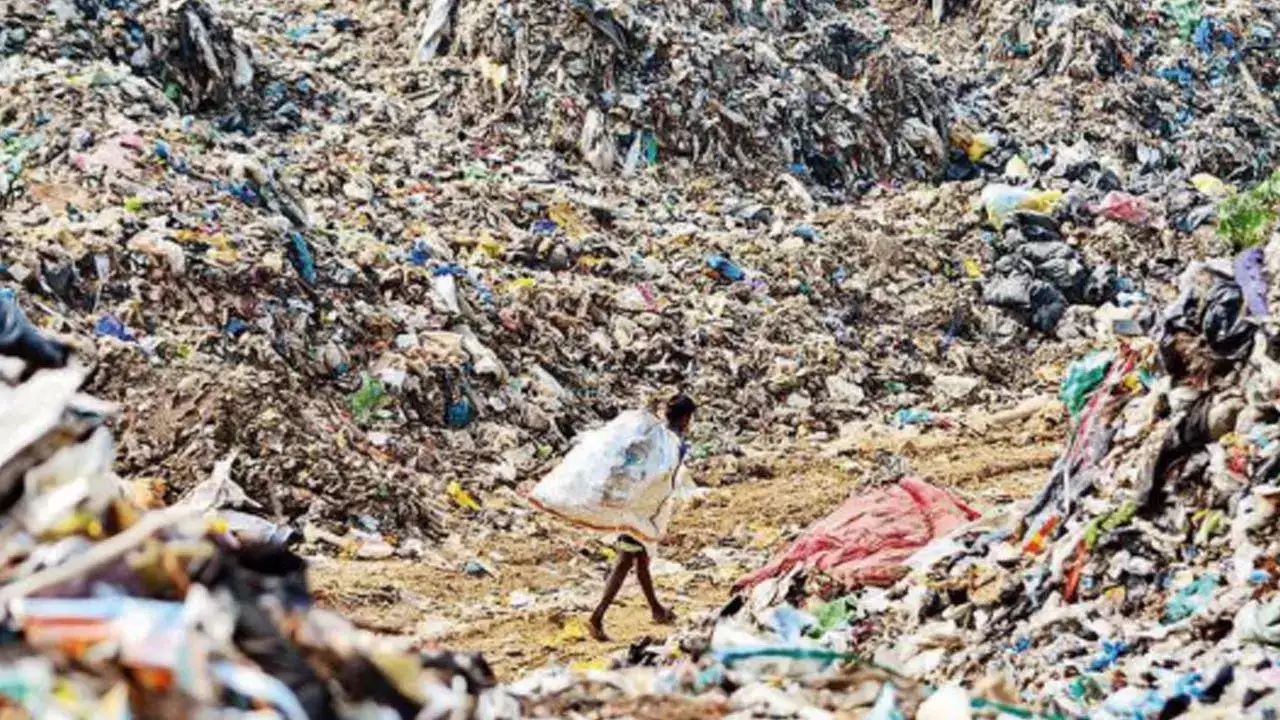Residents of Bharalupar, a locality near the Assam Cricket Association Stadium in Guwahati, are grappling with a growing waste management issue that poses a serious threat to their environment.
The inadequate availability of dustbins and waste disposal systems in the area has led to unsightly heaps of garbage on the streets. As a result, local residents have been compelled to dump their waste into the adjacent Mora Bharalu river, exacerbating pollution levels and environmental damage.Despite repeated appeals to the Guwahati Municipal Corporation (GMC), the residents’ requests for additional dustbins have largely gone unheeded, leaving them without adequate waste management solutions. In an attempt to manage waste during the upcoming IPL match, authorities have placed a green net over a portion of the Mora Bharalu river. While the net is believed to be a temporary measure, it has raised suspicions among locals.
Some residents speculate that the net’s purpose is to conceal the pollution in the river, while others believe it was installed to combat mosquito breeding, especially after partial river cleaning efforts.A local resident voiced their frustration, stating, “The waste along the road is only being cleared because of the IPL matches. Otherwise, it would have remained unattended. We need proper dustbins, and the GMC should ensure regular waste collection.” This sentiment highlights the larger issue: waste management seems to be given only sporadic attention, tied to the event-driven demands of the city rather than a consistent, long-term plan for improvement.
Previously, the GMC introduced small bamboo dustbins in the area to help with waste collection. However, these bins often toppled over due to overflowing garbage, proving to be ineffective for the growing waste volumes. Moreover, residents have noted that the previously reliable daily garbage collection services have become irregular. The shortage of vehicles has left many areas uncollected, further compounding the problem.
The municipality has been undertaking de-siltation work in the Mora Bharalu river as part of the ‘Mission Flood Free Guwahati’ initiative, aiming to improve the river’s health and flood resilience. However, without addressing the root cause—consistent and efficient waste management—the situation remains unresolved. In fact, the failure to establish a permanent and sustainable solution to waste disposal continues to undermine the positive effects of the river’s partial cleaning.
The growing waste crisis in Bharalupar mirrors a larger challenge faced by many areas in Guwahati, where infrastructure and municipal services often fail to keep up with the rapid urbanisation and population growth. While initiatives like the ‘Mission Flood Free Guwahati’ project are crucial for improving flood resilience and river health, they cannot succeed without a parallel focus on addressing the fundamental issues of waste management and environmental sustainability The situation in Bharalupar calls for urgent action. The GMC must prioritise providing proper waste disposal infrastructure to prevent further environmental degradation and enhance the quality of life for residents. Temporary measures,
such as the green net placed over the Mora Bharalu river, are insufficient if they are not part of a broader, sustainable waste management strategy. If Guwahati is to continue growing as a modern city, it must invest in robust and eco-friendly solutions that address both waste disposal and long-term environmental protection.This issue also highlights the need for a more equitable approach to urban development in Guwahati. Waste management services should not be provided sporadically or as a reaction to specific events; they should be a consistent, equitable service for all residents, regardless of their proximity to high-profile venues like the cricket stadium. Only through a comprehensive, sustainable approach can Guwahati ensure its future growth aligns with the principles of a zero-carbon, eco-friendly, and livable city for all its citizens.


